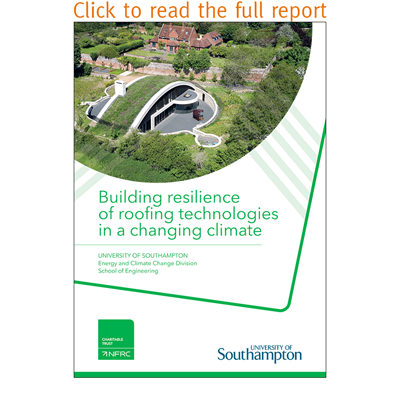NFRC Climate Resilience Guidelines
Bauder is a leading manufacturer of waterproofing and insulation for flat roof construction, also renowned for innovative rooftop solutions to promote sustainable building practices in the shape of biodiverse green roofs, blue roofs for rainwater management, and solar PV arrays for renewable energy generation. Bauder is delighted to support the recent research carried out by Southampton University for the National Federation of Roofing Contractors (NFRC) on climate resilience in the roofing industry which highlights the benefits of green, blue and biosolar roofs in adapting to climate change.
As a charitable trust, the NFRC recognise the magnitude of the challenge that climate change poses to society and has therefore commissioned the Energy and Climate Change Division of the School of Engineering at Southampton University to investigate the impact of climate change in the UK on the built environment and how the roofing industry can innovate to alleviate the risks posed.
Peter G Rogerson, NFRC Chair, explains: “A roof is the first line of defence against the elements and plays an essential role in keeping a building wind and watertight. As the UK’s climate is set to become wetter, warmer and experience more extreme weather events such as torrential rain and heatwaves over the next half-century, the way we build, maintain, and upgrade our roofs will become increasingly important.”
The report investigates the risks faced as a result of climate change including flooding and overheating, how the roofing industry can contribute to the resilience of the built environment by delivering technical solutions, and where the potential barriers to adaptation may occur.
Recommendations from the research are directed at both the roofing industry and the government.
THE INDUSTRY
- Address the skills gap by investing in green skills throughout the current and future workforce, including apprenticeship frameworks.
- Contractors should diversify their businesses to incorporate green technologies.
- Reflectivity of materials should be considered at the design stage.
THE GOVERNMENT
- Incentivise the retrofitting of public buildings to prepare them for the warmer, wetter climate.
- Introduce a strategy, which includes financial incentives, to support homeowners in upgrading their properties with measures to reduce overheating and support energy resilience.
- Proposed changes to building regulations concerning overheating should be fast tracked.
- Apply pressure to local authorities to incorporate roofing technologies that help to build climate resilience into their planning policies.
Patrick James, Professor of Energy and Buildings at the University of Southampton, commented: “Evidence from the research community has highlighted the benefits of roofing technologies such as green and blue roofs, notably to reduce flooding risks, as well as providing many other benefits including enhancing biodiversity, reducing the urban heat island effect, and cutting down pollution levels.”
Tom Raftery, Sustainability Lead for Bauder Flat Roofing, added: This report highlights that adaptation and resilience to climate change should be a central part of the decision-making process for all specifiers and clients. Flat roofs provide an opportunity to positively impact our urban environments and reduce the worst impacts of climate change if the correct products and solutions are used.
Chris Roddick, Bauder’s Green and Blue Roof Product Manager, advised on the report and is responsible for developing some of the roofing systems that will be required to help mitigate climate change. “Whilst green roofs have long been part of Bauder’s portfolio, it is increasingly apparent that roofs can do more to help. Bauder’s blue roof systems prevent uncontrolled rainwater runoff and can be combined with PV and green roofs to provide power, improved air quality, insulation, and biodiversity.”
